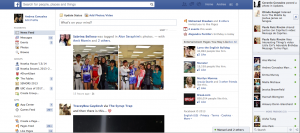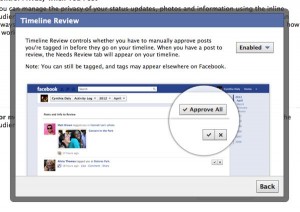Over the past few weeks, the work we have done in class about life narratives has sparked my interest on the differing pathways that can be used in the construction of human identities. During our PostSecret group presentation, I had the opportunity to delve into the creation of personal identities through visual and the verbal elements in PostSecret postcards. However, looking back, I realize that our presentation suffered a key limitation: in our sole focus on PostSecret, we only touched upon a specific form of self-disclosure- that is, self-disclosure in an anonymous virtual world. We neglected to consider “nonymous” social networking sites such as Facebook, which have come to redefine both our social interactions and our personal identities. In particular, the highly popular website Facebook, (which I assume requires no introduction) provides a virtual platform through which we can shape and re-shape our identities.
Before I move on to my main argument, I’d like to first provide a sociological framework for my ideas, specifically the sociological perspective that we discussed just this past week in our CAP Sociology lectures: Sociologist Erving Goffman’s concept of dramaturgy. In essence, Goffman argues that our actions as individuals are a series of theatrical performances. Therefore, much like actors in a play, we adjust and enhance facets of ourselves in different scenarios, assuming masks to project“ideal” images for specific audiences. We see this theatricality explicitly manifested in various forms in our society. To take an example, when political figures such as Barrack Obama deliver public speeches, they laboriously control their vocal gestures and body language to convey qualities that are socially expected of leaders of their stature- the most prominent of which are conviction, courage, strength, and integrity. Once they descend the stage and are away from the public eye in the “back stage” they undergo a transformation. But this is not restricted to political figures. We also change masks constantly in our everyday lives. For instance, the version of ourselves that we show our parents distinctly differs from the version that emerges in the company of our friends.
Taking this into consideration, it could be said that Facebook is its own theatrical stage, where people put forth a “front stage” performance. Through a combination of symbols, photographs and text, individuals present, shape and alter their identities. The template of the personal profile itself allows users to divulge a significant amount of personal information, including personal preferences. These serve to classify them into specific subcultures, acting as vehicles to the projection of a highly-specified “self”. Yet self-representation is not limited to the “About me” box, far from it in fact. Each picture and status, however insignificant it may appear, can actually be considered an identity marker. A relatively new addition to Facebook that I find fascinating in terms of identity construction is the Timeline Review, a tool that allows us to check photos or posts that we are tagged in before they appear on the public timeline. As you can see below, the tool offers the option to accept or deny the post before it is posted on the timeline. Further, it enables the user to decide which specific Facebook friends will have access to the content. Features such as this are allowing us to attain even more control over who gets to see what dimensions of our personality. As Facebook users, we specifically select the dimensions that we want to highlight. Those that we want to conceal are literally “hidden” from our timeline, helping us to construct segmented online identities.
Returning back to the idea of Facebook as a metaphorical theatrical stage, does this then mean are we all wearing masks?
Perhaps not. Then again, I do believe that, given the multiple tools that we have to construct our identities, we should be more critical consumers of Facebook profiles.
What do you think?
Can the selves we show in social networking sites ever be considered “authentic”?



I think you did a great job in linking our ASTU lecture of digital narratives to Sociology. I think that the identities we create on social networking sites are, to some extent, authentic. People usually post things that are true, and having “friends” on Facebook that (most likely) know us in real life can help ensure that the things we post is real, because they would probably challenge our claims if they were fake. However, I think that our online identities are definitely biased, because we construct the way we would like to be perceived like others. Depending on what kind of things we choose to share, I think that we are wearing “masks” online.